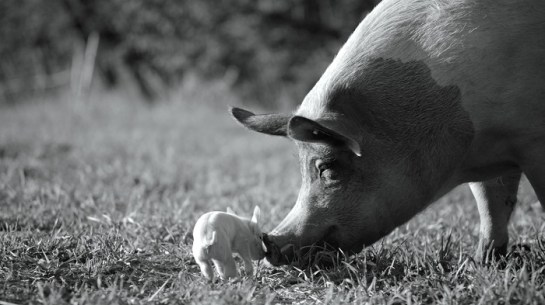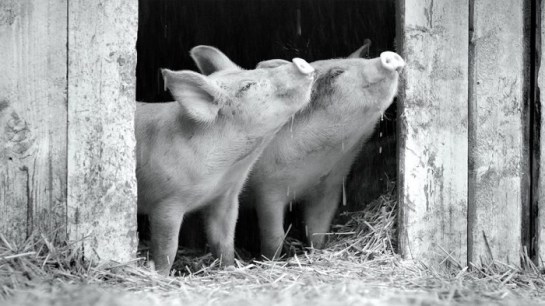
I’ve always been amazed by cinema’s ability to take the simplest idea and turn it into something powerful and deeply affecting. It’s a mark of great moviemaking that has impacted generations since the birth of the industry. For a more recent example look no further than the quietly meditative and subtly message-minded “Gunda” from Russian filmmaker Viktor Kossakovsky. The film also sports Joaquin Phoenix as its executive producer.
This Norwegian documentary sees Kossakovsky directing, co-writing, co-editing as well as sharing cinematography duties. Shot in stunning high-contrast black-and-white, “Gunda” opens with a gorgeous still shot of a small wood pigsty. A sow lays on a bed of hay, its head partially out of the sty basking in the sun’s warm glow. The camera sits on the shot, admiring its simplicity and beauty. Then we notice movement in the shadows. Tumbling over its mother and out the doorway is a tiny piglet followed by another and then another. The shot cuts to inside where we get a clearer picture of what’s going on. Gunda, the eponymous sow is giving birth. It’s a beautiful scene and a clear introduction to the kind of film Kossalovsky has for us.

Image Courtesy of NEON
“Gunda” shrewdly brings us into the farm animal’s world, immersing us in the everyday minutiae of farm life from their distinct perspective. To emphasize their point-of-view Kossalovsky is always shooting from his subject’s eye level. And when mixed with Alexandr Dudarev’s sublime sound design you get the indescribable sensation of not only being present but within arms length. Take an exquisitely captured sequence when Gunda and her piglets go for a stroll in the farmyard. The unintrusive camera subtly follows the rambunctious little ones at ground level, watching as they root and roughhouse while mama keeps a watchful eye. With the extraordinary closeness comes a certain unshakable intimacy and the clarity of the images means we catch every astonishing detail.
There are the occasional shifts to other livestock that almost work as interludes to Gunda’s story. One features a resilient one-legged chicken who refusing to let his disability slow him down. Later we watch cows burst out of a barn and then run across the field like kids on a playground racing to their favorite spot. Neither segment can cleanly escape feeling a little like filler. Yet both are shot with the same equally captivating photography and both feed into the film’s goal of getting its audience to reconsider how they think of farm animals.

Image Courtesy of NEON
But Gunda and her piglets are the stars and the film always comes back to them after a chunk of time has passed. As the film moves forward and the piglets get older, an impending sense of doom sets in. Interestingly not a single human being is ever seen on screen nor a single voice ever heard. We only see the marks of their presence. But over time the audience is faced with the inevitable realization that it’s the humans who are the determiners of fate. This is shown with heartbreaking clarity in the film’s heartbreaking final moments.
While its message is crystal clear “Gunda” never lectures or browbeats. There’s no music to guide our emotions or narration to explain what we’re seeing. It doesn’t frame or stealthily edit scenes for dramatic effect. Instead “Gunda” asks its audience to observe, absorb and ponder. It’s unflinching dedication to its vision could prove too tedious for some. But for those able to fall in with the movie’s gorgeous poetic rhythm, it’s sure to resonate in a number unexpected ways. All while showcasing what Paul Thomas Anderson could only describe as “pure cinema”. “Gunda” received a limited release December 11th.
VERDICT- 4.5 STARS


Sounds like it could have a pretty strong pro – vegetarian message, if I understood you correctly. Sounds good to me! :–)
That message it certainly there but it doesn’t Lund you over the head with it. It simply observes, allowing the images to speak for themselves. It’s astonishing filmmaking.
Hmm. Sounds like it might make tears, which I’m not fond of.
It could make the faucets leak just a little. 😉
Pork has been off of my plate for a good 30 years now. Sounds like my kind of “pure cinema” with an impactful message. Hoping kids around the world see it. Too many pigs these days are confined in crates where they can’t move or enjoy sunshine, in factory farms. “Okja” (netflix) is another film with an anti-meat message but depicted in a much more sinister way. Unbelievably netflix has tagged it as a comedy!
They have Okja listed as a comedy???
Just checked it again. They must have gotten so many complaints they took off that genre tag. Now it’s listed as drama.
Much better than comedy, right! 😂
Just because it has elements of comedy on its surface it should be labeled horror! I take it you’ve seen it.
I have. It’s been a while.
I think I saw this trailer a month ago and I want to see it. Just for the look and simplicity of the film.
It’s great. The cinematography and sound design are stunning.